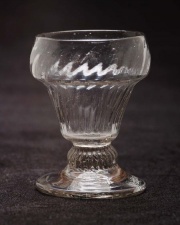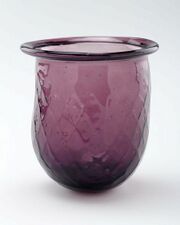Difference between revisions of "Molded glass"
Jump to navigation
Jump to search
| Line 2: | Line 2: | ||
== Description == | == Description == | ||
[[File:Image3_802380.jpg|thumb|Vase<br>MFA# 1978.1209]] | [[File:Image3_802380.jpg|thumb|Vase<br>MFA# 1978.1209]] | ||
| − | A type of glassware prepared by blowing molten glass into a metal mold. | + | A type of glassware prepared by blowing molten glass into a metal mold made from [[iron]] or [[bronze]]. This method for making glassware was used in America in the early 19th c. as an inexpensive way to produce glassware similar in appearance to the much more expensive cut glass that was imported from Britain and Ireland. Blown molded glass was popular for about twenty years before it was superseded by [[pressed glass]] in the mid-19th c. |
| + | == Synonyms and Related Terms == | ||
| + | blown molded-glass; three-mold glass | ||
| + | ==Physical and Chemical Properties== | ||
| + | * The inverse of the pattern of three-mold glass can be felt on the inside of the object | ||
| + | * Tiny raised hairline seams where the mold sections were joined and a slight displacement in parts of the pattern may be seen | ||
| + | |||
| + | ==Resources and Citations== | ||
| + | * Wikipedia: [https://en.wikipedia.org/wiki/Early_American_molded_glass Early American molded glass] Accessed Set. 2022. | ||
[[Category:Materials database]] | [[Category:Materials database]] | ||
Latest revision as of 08:57, 27 September 2022
Description
A type of glassware prepared by blowing molten glass into a metal mold made from Iron or Bronze. This method for making glassware was used in America in the early 19th c. as an inexpensive way to produce glassware similar in appearance to the much more expensive cut glass that was imported from Britain and Ireland. Blown molded glass was popular for about twenty years before it was superseded by Pressed glass in the mid-19th c.
Synonyms and Related Terms
blown molded-glass; three-mold glass
Physical and Chemical Properties
- The inverse of the pattern of three-mold glass can be felt on the inside of the object
- Tiny raised hairline seams where the mold sections were joined and a slight displacement in parts of the pattern may be seen
Resources and Citations
- Wikipedia: Early American molded glass Accessed Set. 2022.

